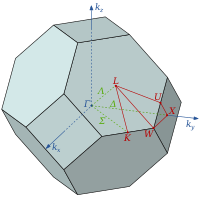
Back تناظر (فيزياء) Arabic Сіметрыя (фізіка) Byelorussian Simetria en física Catalan Симметри (физика) CV Symmetrie (Physik) German Simetrio (fiziko) Esperanto Simetría en física Spanish تقارن (فیزیک) Persian Symétrie (physique) French Սիմետրիա (ֆիզիկա) Armenian
This article includes a list of general references, but it lacks sufficient corresponding inline citations. (February 2018) |

The symmetry of a physical system is a physical or mathematical feature of the system (observed or intrinsic) that is preserved or remains unchanged under some transformation.
A family of particular transformations may be continuous (such as rotation of a circle) or discrete (e.g., reflection of a bilaterally symmetric figure, or rotation of a regular polygon). Continuous and discrete transformations give rise to corresponding types of symmetries. Continuous symmetries can be described by Lie groups while discrete symmetries are described by finite groups (see Symmetry group).
These two concepts, Lie and finite groups, are the foundation for the fundamental theories of modern physics. Symmetries are frequently amenable to mathematical formulations such as group representations and can, in addition, be exploited to simplify many problems.
Arguably the most important example of a symmetry in physics is that the speed of light has the same value in all frames of reference, which is described in special relativity by a group of transformations of the spacetime known as the Poincaré group. Another important example is the invariance of the form of physical laws under arbitrary differentiable coordinate transformations, which is an important idea in general relativity.